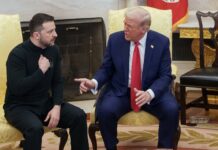Russia’s invasion of Ukraine has so far been carried out over 2 years at this point. The amount of death and destruction that have so far been maintained by Ukraine has been staggering. Entire cities and states that had previously been filled with civilians now lay in ruins.
Millions of Ukrainians have been displaced within the country and many have fled to neighbouring European states and North America.
During the first year of the invasion, Ukraine managed to achieve what many had seen as impossible, as they managed to significantly push back the Russian forces and the signs had looked very promising, of them potentially winning the war and taking back their territory.
They managed to do this in part because of the massive influx of military aid from Western nations in Europe and North America as well as other nations such as:Japan, South Korea, etc.
However, as the war has continued to drag on over years at this point, the military aid that Ukraine is so dependent upon has not been as forthcoming from its allies. Members of far right parties in Europe and America have increasingly sought to undercut their government’s military support for Ukraine.
In the United States, far right members of congress held up a military support package for Ukraine for many months. It was only able to pass through after US house speaker Mike Johnson decided to bring the package up for a vote despite the opposition by the far right members of his party. In Europe, figures such as Viktor Orban in Hungary have on multiple occasions sought to undermine the European Union’s support for Ukraine.

Africa’s response to the Invasion
In an emergency session on March 2, 2022 held by the United Nations, members voted on a resolution to condemn Russia’s invasion of Ukraine. Accoridng to the bookings intsititute, 28 out of the 54 African countries (just over 51 percent) participate in a vote condeming Russia for the invasion. 17 African countries abstained and 8 did not vote at all. Only one African country, Eritrea, voted against the resolution, alongside Belarus, Russia, North Korea, and Syria.
However, as the invasion had continued to drag on most African governments have sought to remain publically neutral when addressing the invasion of Ukraine.
On the 16 of June 2023, a group of African leaders embarked on a so-called “peace-mission” to Ukraine. Zambia’s President Hakainde Hichilema, Senegal’s President Macky Sall, The President of the Comoros Azali Assoumani, South African President Cyril Ramaphosa and Egypt’s Prime Minister Mostafa Madbouly visited a site of a mass grave in the Ukrainian town of Bucha. However, the trip faced criticism for its lack of substance, particularly for its failure to explicitly condemn Russia or express support for Ukraine in the face of Russian aggression.
In May 2023, the US ambassador to South Africa accused the government of covertly providing arms to Russia. Accoding to the Guardian, the US ambassador, Reuben Brigety had said that the US believed weapons and ammunition had been loaded on to a Russian freighter that docked at a Cape Town naval base in the previous December. The Ambassador had said that the US was confident that weapons were loaded on to that vessel and stressed that “The arming of Russia by South Africa… is fundamentally unacceptable.” The South African government had denied the accusations that they had sent Russia weapons.
The only African country that seemed to explicitly break with its perceived neutrality was Morocco, after they had provided Ukraine with military equipment. Morocco had reportedly at the request of the United States, agreed to transfer spare parts for T-72 tanks to the Ukrainian military.
Africa’s “neutrality” helps no one
The reality of who the aggressor and who the victim in the conflict is as clear as it can be. Russia is invading a sovereign country in an unprovoked attack. This invasion had lead to a countless loss of Ukrainian and Russian lives. It is believed that deaths among army members is within the hundreds of thousands.
In addition to the loss of life, Ukrainian critical infrastructure across the country has been severely damaged in Russian shelling. It’s not uncommon to see another headline of a massive barrage of rocket attacks hitting Ukraine overnight. Living in bomb shelters has become an unfortunate reality for so many Ukrainian civilians.
It makes one wonder how so many African governments view this amount of violence and brutality and choose to be “neutral?”
African countries, given our history of colonialism within the continent, should possess a heightened sense moral clarity regarding this invasion.











